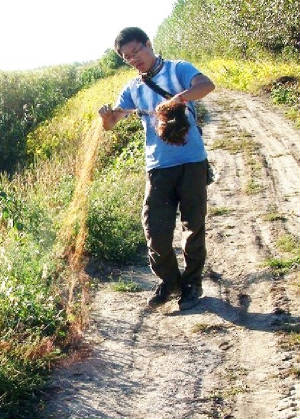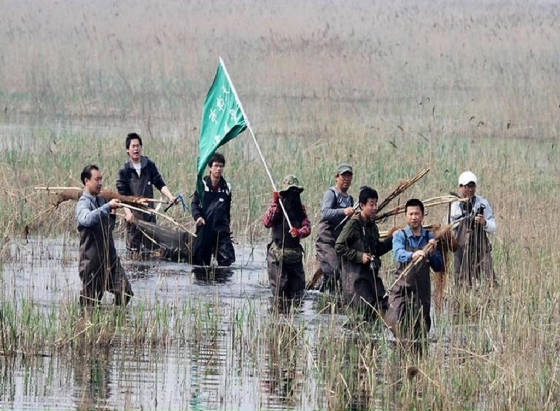|
Finding Nemo

|
| Nemo... Inspiring a generation |
Many years from now – at a point in time when the number of birds migrating through China is many, many millions more than
it is today; when membership of the CSPB (the China Society for the Protection of Birds) tops 10 million;
and when every school in China has a birdwatching society –
legions of older Chinese birdwatchers will tell and re-tell the
horror stories of the dark time when it wasn't like that. They will tell
the young ones of the time when, many years before, millions of migrant birds were slaughtered for their meat or imprisoned
in cages because of their beautiful plumage or melodious voice.
They will tell of the countless numbers of birds that were left to die in the trappers' nets because
they were neither beautiful nor edible. And they will talk of the time when not nearly
enough people cared. They will also recount the true story of how this
began to change... and how that became the story that inspired a generation of young people. Many years from now, the school book "Protecting the
environment in China and how you can help" will tell of the events of the 15th
October 2012 and of the local heroes who, because of what happened on that date, were launched into the limelight to
become beacons of hope in what was a dark period for China's birds. This is how the true story of what happened might be told: Guidong County was an out-of-the-way
mountainous area in Hunan province. It was a remote, backward place. It was also a lawless place. The [Chinese] adage that "The mountains are high and the emperor is far away" was
as true in Guidong in 2012 as it was when the maxim was coined, a thousand years before. Hundreds of people
in Guidong had guns (despite this being a serious crime). Hunting parties of up to 200 would go out at night using
high-power search lights to lure huge numbers of migrating birds, which they mercilessly shot. This
had been going on for years.
Everyone in Guidong, including the local police and authorities, knew this was happening. But nothing had been done
about it. Until, that is, a very brave reporter from the Changsha Evening News, the provincial capital's most popular
newspaper, went to Guidong to expose the criminality there. In several visits, Li Feng infiltrated the
hunters' ring and compiled the evidence that would be the catalyst that changed attitudes. He secretly filmed
the hunters at their "safe houses", the night-time shooting parties, and also filmed the traders selling the carcasses
of the shot birds in local markets. In Guidong, the market price of a bird was determined
by the length of the bird's neck and by the taste of its meat. Xinhua [China's official news agency] reported that:
"Birds with long necks, such as egrets and herons, sold for between
10 [US$1.60] and 70 yuan, while short-necked eagles and owls are priced at hundreds of yuan as the taste of their meat is
preferred." Xinhua also reported that in the counties of Guidong, Xinhua and Xinshao,
hunting parties from one village alone could kill,”150 tonnes of wild
birds a year".
The local hunting parties also included rich people from outside the area who would pay a lot of money to shoot herons,
egrets, owls, and eagles and "...Come in luxury limousines with beauties
and beers, taking it as an aristocratic pastime, which has become a troublesome fashion" [Xinhua
reported, citing Mr Yang, a local forestry worker]. In the autumn migration of 2012, Li Feng, a local-hero journalist risked his life to shoot the
video that exposed the gunmen's evil deeds. The video also pointed the finger at the corrupt local police
and officials who allowed this to happen under their noses. The video first ran locally in Hunan. The people
who saw it were outraged. So much so that they told others about it. In turn, these people passed on the link to their friends and contacts.
The ever vigilant TV networks, realising that this was becoming a big story, began screening the video locally (in dozens
of different places). By the end of the 14th October, many thousands of people had seen the video. Then, on October 15th, there was a tipping point. During that day, interest in the story
reached critical mass... and the social media version of a reactor meltdown was unleashed. Interest in the story exploded with such incredible ferocity that, by the end of that day, millions
of people had seen the video or read about the atrocities that had been perpetrated in Hunan province. The public
was horrified and very, very angry. One blogger, a Ms Liang, wrote
on Sina Weibo, "How could this happen??!! We should be ashamed!!
The corrupt officials who let them [the gunmen] get away with it must be severely punished!!" In the days following this news
peak, more and more influential news agencies published their condemnation of not just the slaughter, but also the local authorities'
complicity. The China Daily released a hard-hitting opinion piece (that had first
appeared in the Beijing News), which summed up the problem and the solution: "The truth is that local forestry officials and police are shirking responsibility, because they can
stop the brutal killing of birds if they strengthen joint law enforcement. For a change, they can stop the selling and buying
of migratory birds in local markets, and impose heavy fines on people indulging in such activities".

|
| Stop!! In the name of love [of birds] |
In the following two weeks, hundreds of news articles about the suffering inflicted on wild birds all across
China were published [before that, there had been only a handful written every year]. Then, gradually, the focus
of the media's attention shifted from the problem to the solution... to the urgent need to protect China's birds. That's when
the news agencies began to appreciate the importance of people like Nemo, who had been doing something about the problem
for a long time [but had, until then, not received any recognition from the media because bird protection
had not been a "hot" topic]. Some very big news
agencies began to take an interest in Nemo and what he and his 20 strong group of friends were doing in Tianjin.
This band of brothers [and quite a few sisters] from universities in Tianjin, had decided enough was enough, and had made
it their business to destroy any nets they found while they were out watching birds around the local lakes and marshes.
One of Nemo's friends, Mr Ma [famous in birdwatching
circles for having wrestled guns away from hunters], helped to organise the raids with military precision. This
fearless group of bird-protectors donned wading boots and splashed into the marsh with their flag held high [see
the photo below]. After a lot of hard work, the local heroes marched out again with hundreds of metres
of illegal nets, which they later burnt. They also managed to release at least one bird from the net that would otherwise
have died. A very influential editor from a famous national
news bureau, who had already been very supportive of the cause [by publishing a number of articles in a bid to defend
China's birds] pledged his support for the students from Tianjin and their principled stand against the forces of evil.
He also worked hard to persuade his network of editors and reporters of other high-profile news agencies that the
issues surrounding the protection of wild birds was something that deserved far more column-inches and TV coverage. This media activity created a second wave
of interest that kept the issue front-of-mind on the weibos [China's Twitter-like social network sites that have hundreds of millions of
active users]. The virtuous
cycle [of news stories generating comment in social media, which in turn makes more national and local news agencies more
likely to cover the story and, consequently, provokes more people to tweet and re-tweet about it... and so on and so forth]
had now gathered even greater force. To the
extent that, all across China, provincial and local media companies began to
realise the importance of finding their very own Nemo. The rest, as they
say, is history.

|
| Local heroes. Please click on the photo to see more photos of them. |
|

